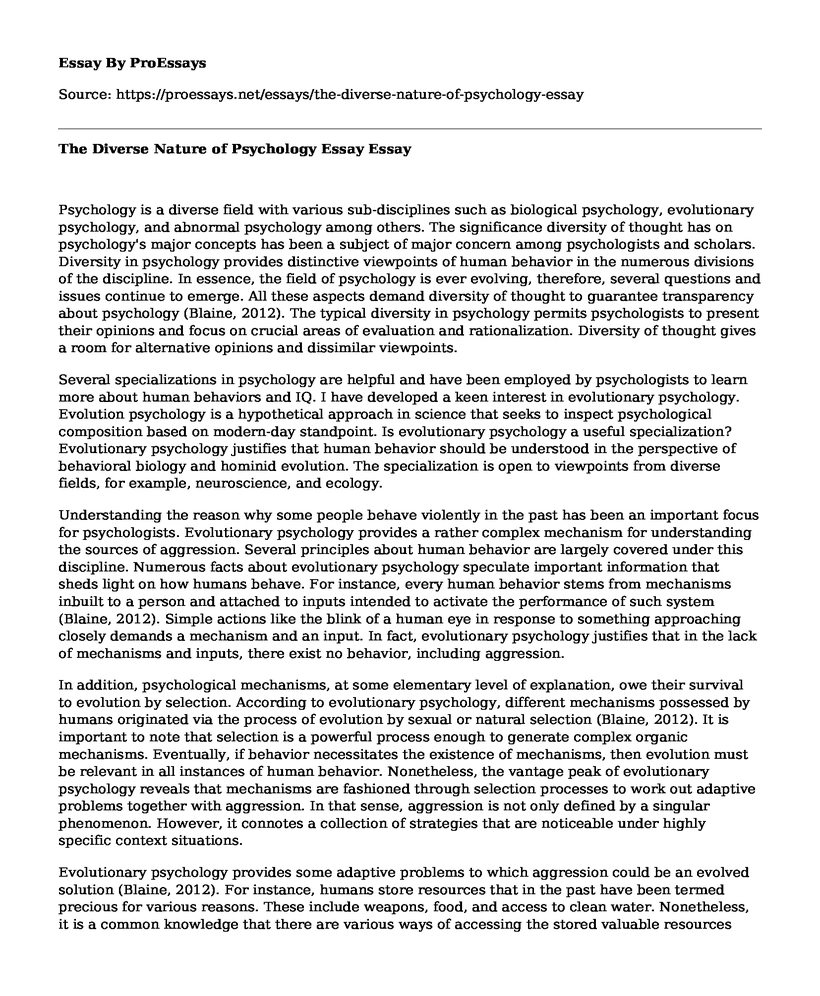Psychology is a diverse field with various sub-disciplines such as biological psychology, evolutionary psychology, and abnormal psychology among others. The significance diversity of thought has on psychology's major concepts has been a subject of major concern among psychologists and scholars. Diversity in psychology provides distinctive viewpoints of human behavior in the numerous divisions of the discipline. In essence, the field of psychology is ever evolving, therefore, several questions and issues continue to emerge. All these aspects demand diversity of thought to guarantee transparency about psychology (Blaine, 2012). The typical diversity in psychology permits psychologists to present their opinions and focus on crucial areas of evaluation and rationalization. Diversity of thought gives a room for alternative opinions and dissimilar viewpoints.
Several specializations in psychology are helpful and have been employed by psychologists to learn more about human behaviors and IQ. I have developed a keen interest in evolutionary psychology. Evolution psychology is a hypothetical approach in science that seeks to inspect psychological composition based on modern-day standpoint. Is evolutionary psychology a useful specialization? Evolutionary psychology justifies that human behavior should be understood in the perspective of behavioral biology and hominid evolution. The specialization is open to viewpoints from diverse fields, for example, neuroscience, and ecology.
Understanding the reason why some people behave violently in the past has been an important focus for psychologists. Evolutionary psychology provides a rather complex mechanism for understanding the sources of aggression. Several principles about human behavior are largely covered under this discipline. Numerous facts about evolutionary psychology speculate important information that sheds light on how humans behave. For instance, every human behavior stems from mechanisms inbuilt to a person and attached to inputs intended to activate the performance of such system (Blaine, 2012). Simple actions like the blink of a human eye in response to something approaching closely demands a mechanism and an input. In fact, evolutionary psychology justifies that in the lack of mechanisms and inputs, there exist no behavior, including aggression.
In addition, psychological mechanisms, at some elementary level of explanation, owe their survival to evolution by selection. According to evolutionary psychology, different mechanisms possessed by humans originated via the process of evolution by sexual or natural selection (Blaine, 2012). It is important to note that selection is a powerful process enough to generate complex organic mechanisms. Eventually, if behavior necessitates the existence of mechanisms, then evolution must be relevant in all instances of human behavior. Nonetheless, the vantage peak of evolutionary psychology reveals that mechanisms are fashioned through selection processes to work out adaptive problems together with aggression. In that sense, aggression is not only defined by a singular phenomenon. However, it connotes a collection of strategies that are noticeable under highly specific context situations.
Evolutionary psychology provides some adaptive problems to which aggression could be an evolved solution (Blaine, 2012). For instance, humans store resources that in the past have been termed precious for various reasons. These include weapons, food, and access to clean water. Nonetheless, it is a common knowledge that there are various ways of accessing the stored valuable resources counting stealing, aggression, and fair social exchange. Aggression to gain access to the resources held by others can take place at the individual level or group level. Such cases typically involve the use of physical force to occupy resources held by others.
My personal standpoint on this specialization is that evolutionary psychology goes beyond the conventional studies and research covered in the past years. This is a fact because it aims to eliminate the false dichotomy that was earlier linked with the discipline, whereas shedding new light and providing useful information. This detail is evidently attained through suggesting a mechanism to prove that aggression is triggered by specific adaptive challenges confronted in exact cost-benefit contexts. The mechanisms resulting in aggression could remain inactive for the whole life of an individual. This can occur in the event where the application situations are not interfered with at any given time. Concerning this explanation, aggression is founded on evolving psychological mechanisms. Most importantly, evolutionary psychology portrays aggression in connection with adaptive challenges. This standpoint strongly suggests that aggression is not a context-blind approach. However, it is particularly activated in situations where the challenges are stumbled.
Conclusion
Evolutionary psychology nearly touches every aspect of human daily lives, that is, from work, education through health to leisure. Recent techniques have evolved to use less physical force including bullies at school who use tricks such as stealing learning materials from their peers. Some working people frequently involve considerable physical force as a way of extracting resources for personal gain. In fact, some adults can employ the threat of aggression to secure resources held by their workmates. The threat of aggression also negatively affects the health of people whereas it causes insecurity for those having leisure. Conclusively, evolutionary psychology explores different perspectives while clarifying aggression. Moreover, it explicates the fact that social norms and laws generate expectations together with the acts of within-group aggression that are routinely inhibited by individuals experiencing aggressive impulses toward others.
References
Blaine, B. (2012). Understanding the Psychology of Diversity. SAGE. Copyright.
Cite this page
The Diverse Nature of Psychology Essay. (2022, Jul 03). Retrieved from https://proessays.net/essays/the-diverse-nature-of-psychology-essay
If you are the original author of this essay and no longer wish to have it published on the ProEssays website, please click below to request its removal:
- Personality and Genetics
- Paper Example on EBP in Mental and Behavioral Health Facility
- Food Addiction Paper Example
- Reflective Essay on Yourself and Others
- Essay Example on Mental Wellness in New Motherhood: Pregnancy, Birth & Beyond
- Essay Example on Unraveling Brain Hemispheres and Executive Functions: A Cognitive Exploration
- Aphasia: An Acquired Language Condition from a Neurolinguistic Perspective







